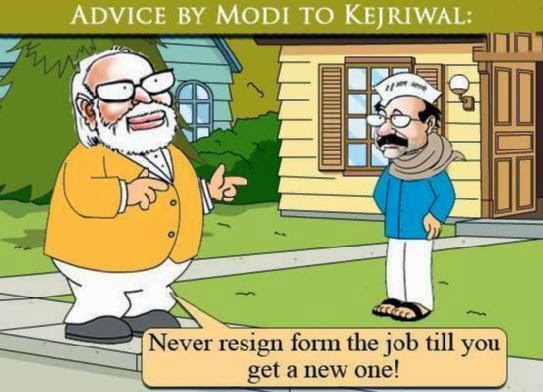I have landed a new job with Access Development Services at Udaipur. That is new news.
So why this cartoon? I broke 'Golden Rule of Quitting' that is quoted by NaMo above in the cartoon. I have also came to believe that nobody should quit job before working at least one year in a new sector. I faced a short term of unemployment as a rural manager. In retrospection, decision of quitting seems courageous but was made in haste and ill advise. The courage of moment is often over-rated and short of time, the word perhaps should be temperament to show mental strength. The days without job are long and depressing. Many rounds of interviews, rejection and low salary offers were part of this phase. It is easier said to follow own conviction than done. Not only the market treat a labour without job with low packages offering, cost of living in NCR dents the saving. Job hunt also showed me skewed distribution of opportunities, of how inequalities, relevant experience, and notion like 'merit' get created.
New job offer came as a great beacon light of hope and luck to me. Beacon that shines on the tower at milestone may not be the one we envision in the start of journey. I am more dedicated and cautious towards career now. But if you are looking this short tragedy with a tinge of heroism that is missing in my scene. I would have not sustained momentum without continuous support of my friends and colleagues. My mentors turned out to be what prof dumbledore was to harry. Help will always be given at Hogwarts to those who ask for it.
Every disadvantage has its advantage, but it is taken only by those willing to look within and introspect. I accept my fault of ignorance and arrogance. Few days of unemployment taught much on strategy of job search, need of vibrant professional network and solid knowledge. By nature I am a very self-critical person. It has its profits and losses. I was in stage of self doubt with constant rejection. Lately, I converted this crisis much to enrich self awareness and life skills. I am confident but will never take own skills for granted for now. Moral of the Story: There is no Moral in the Story! Just words of an underachiever.
“Hold yourself responsible for a higher standard than anybody else expects of you. Never excuse yourself. Never pity yourself. Be a hard master to yourself-and be lenient to everybody else.” ― Henry Ward Beecher
So why this cartoon? I broke 'Golden Rule of Quitting' that is quoted by NaMo above in the cartoon. I have also came to believe that nobody should quit job before working at least one year in a new sector. I faced a short term of unemployment as a rural manager. In retrospection, decision of quitting seems courageous but was made in haste and ill advise. The courage of moment is often over-rated and short of time, the word perhaps should be temperament to show mental strength. The days without job are long and depressing. Many rounds of interviews, rejection and low salary offers were part of this phase. It is easier said to follow own conviction than done. Not only the market treat a labour without job with low packages offering, cost of living in NCR dents the saving. Job hunt also showed me skewed distribution of opportunities, of how inequalities, relevant experience, and notion like 'merit' get created.
New job offer came as a great beacon light of hope and luck to me. Beacon that shines on the tower at milestone may not be the one we envision in the start of journey. I am more dedicated and cautious towards career now. But if you are looking this short tragedy with a tinge of heroism that is missing in my scene. I would have not sustained momentum without continuous support of my friends and colleagues. My mentors turned out to be what prof dumbledore was to harry. Help will always be given at Hogwarts to those who ask for it.
Every disadvantage has its advantage, but it is taken only by those willing to look within and introspect. I accept my fault of ignorance and arrogance. Few days of unemployment taught much on strategy of job search, need of vibrant professional network and solid knowledge. By nature I am a very self-critical person. It has its profits and losses. I was in stage of self doubt with constant rejection. Lately, I converted this crisis much to enrich self awareness and life skills. I am confident but will never take own skills for granted for now. Moral of the Story: There is no Moral in the Story! Just words of an underachiever.
“Hold yourself responsible for a higher standard than anybody else expects of you. Never excuse yourself. Never pity yourself. Be a hard master to yourself-and be lenient to everybody else.” ― Henry Ward Beecher

